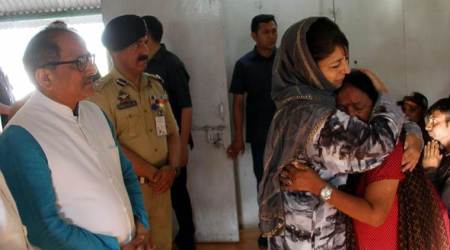 Security person stand guard after militants opened fire on the Amarnath Yatra in which seven pilgrims were killed in Anantnag in Jammu and Kashmir on Monday. PTI Photo
Security person stand guard after militants opened fire on the Amarnath Yatra in which seven pilgrims were killed in Anantnag in Jammu and Kashmir on Monday. PTI Photo
Muhammad Yusuf Dar was buried on the third Friday of May, at his ancestral graveyard in the village of Gadoora, as a few dozen local residents stood by shouting slogans in support of Kashmir’s independence. His body had been found lying in the fields the previous day, ripped apart by bullets, killed by the men he had risked his life to serve.
Now, as J&K Police and intelligence services investigate Monday’s Amarnath Yatra attack, in which seven pilgrims were killed, one question has emerged as key: what led jihad commanders to raise the stakes by executing the first strike on religious pilgrims since 2006?
The answer could lie in the story of that man buried in Gadoora — a committed jihadist, and at the same time, a police spy.
For years now, jihadists have described the Yatra as part of a Hindutva plot to displace Muslims from the Valley, although such messages were rarely acted on. But an investigation by The Indian Express has revealed that a grim war within the Lashkar-e-Taiba, which claimed Dar’s life, may have led its commanders to finally target the pilgrimage in a bid to establish their ideological legitimacy before their followers.
A committed political Islamist, Dar was known to police for providing shelter and assistance to jihadist groups operating in and around his village. His relationship with Pakistani national Abdul Rehman, the LeT commander code-named Abu Qasim who took charge of South Kashmir in 2010-2011, was said to be intimate.
In 2013, sources familiar with the case say, police found their way in, when Syed Abdul Shabir, Station House Officer of Chadoora, was killed by three gunmen at a hardware store in the local bazaar.
Police detained Dar, sources say, and threatened to prosecute him for murder, even though evidence of his involvement was not compelling. “He flatly refused to cooperate,” said an officer. But the pressure finally worked: police in Pulwama cut a deal, sources say, through which Dar began to give them information on imminent LeT attacks, in return for protection against raids and harassment.
“There was, let us say, an arrangement, that Abu Qasim would be left alone as the price for cooperation. Either Qasim didn’t know, which isn’t likely, or he was willing to pay this price for his own safety,” said a senior officer involved in running Dar.
Following an attack at Srinagar’s Hyderpora bypass, which claimed the life of eight soldiers, what had been a local deal became a key intelligence operation. Information from Dar, intelligence and police sources say, helped terminate at least six fidayeen operations, with LeT operatives being eliminated before attacks could begin.
The August 5, 2015, terror attack on the BSF in Udhampur proved a deal-breaker, though: Abu Qasim was hunted down and killed.
Inside the Lashkar, intelligence sources say, many suspected that Dar had something to do with Qasim’s killing. Qasim’s successor — still known only by the alias Abu Dujana — steered clear of Dar and his support networks, fearing infiltration. However, as the months ticked by, a new modus-vivendi developed between the two men, with Dujana discovering Dar’s use as a logistics provider.
Through 2016, as large-scale protests swept South Kashmir in the wake of the killing of Burhan Wani, the LeT was ordered to maintain a low profile, and focus on building a popular base. Dujana, sources say, used the opportunity to marry a local woman in the village of Singoo near Kakapora in Pulwama. Armed operations almost ground to a halt, even as the flow of information continued.
Soon, sources say, Dujana’s deputies began to question his actions, blaming Dar’s influence. One of them, code-named Abu Ismail, even set up a rival faction, along with ethnic-Kashmiri jihadist Muhammad Ayub and two other south Kashmir residents. The group operated in the belt from Chadoora to Pampore, seeking to cash in on the rage unleashed after Wani’s death.
Meanwhile, sources say, police mounted pressure on Dar to deliver his boss, Dujana. The LeT’s growing popularity in southern Kashmir had become a source of strategic concern, and the fact that it had long-serving leaders like Dujana was seen as a key reason for its ability to garner support in the countryside.
In May, Dar delivered. Dujana was trapped in an Army cordon in north Kashmir, where he had gone to receive two new fidayeen. But the operation was bungled, and the target escaped. Days later, Dar was found shot dead.
Ismail, Dujana’s rival, may have taken advantage of this display of incompetence to display his own credentials with the Yatra attack, intelligence officials say. Named by J&K Police as the possible perpetrator, Ismail was identified in an Intelligence Bureau memorandum issued three days before Monday’s killings as planning a strike on the Yatra. The IB warning, issued by its Srinagar station, spoke of an imminent attack.
Dujana’s own group, sources say, tied up with the dissident Hizb-ul-Mujahideen commander Zakir Rashid Bhat, alias Zakir Musa, who has called on Indian Muslims to “do jihad against these kafirs”. Like Ismail, Dujana also had a motive: restore his shattered credentials before his new collaborators.
The actual strike, sources say, might also have been carried out by Hizb units in the Kulgam area, a possibility built on the fact that the road from the area where the pilgrims’ bus was shot at leads to the south Kashmir town.

